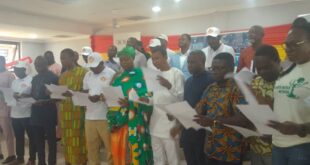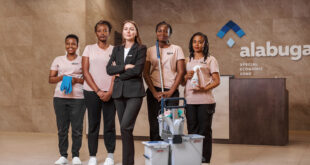Nelson Boateng is a 36-year-old Ghanaian, building houses and producing pavement blocks with plastic waste in Ghana.
After graduating from school with a diploma in computer networking engineering, Nelson was determined to provide solutions to the country’s plastic menace and ventured into recycling.
“There is an opportunity in every bad situation. We are seeing plastic as a problem, but we can turn this into a good resource to solve other problems”, Nelson stated.
With his recycling company, “Nelplast Ghana”, Nelson recycles plastic waste into other products. His innovation won him a grant from the first edition of the Waste Recovery Innovation Challenge, organized by the United Nations Development Programme (UNDP) in partnership with the Embassy of the Netherlands in Ghana, under the Ghana Waste Recovery Platform.
A Proud Journey
Globally, about 8 million tons of plastic waste pollute the oceans every year, and millions of animals are killed by plastics, from birds to fish to other marine organisms.
Ghana alone generates about 1 million tons of plastic waste annually but only about two percent of the country’s single-use plastic bottles are recycled.
The rest are sometimes improperly disposed of, choking gutters and drainage systems.
For Nelson, his passion and love for the environment began in his early days at age 13, when he started working with a recycling company to earn some income to support his parents to take care of him and his 5 other siblings.
He started Nelplast in 2013 and at that time, he was only recycling pure water sachets into pellets and selling these to polythene bags producers.
Realizing that the polythene bags still go back into the environment, Nelson decided to conduct extensive research, where he discovered how to add more value to plastic waste.
The research revealed how bricks could be made with plastics mixed with sand, so, he started prototyping.
During the process of prototyping, Nelson was constrained as far as technology was concerned and needed support to be able to use the right technology.
“We were actually burning the blocks in metallic drums, then we add sand to it but that was still polluting the environment and we didn’t see ourselves helping”, noted Nelson.
Partners at the Rescue
Nelson received support from various competitions including the Africa Innovates for the SDGs Awards in 2018, launched by the President of Ghana, Nana Addo Dankwa Akufo-Addo, who is also a Co-Chair of the Group of Eminent Advocates for the Sustainable Development Goals (SDGs). This, he said, he invested into research which enabled him to identify the right technology.
Then came the support from the Waste Innovation Challenge in 2019, which he described as very timely because he was able to use this fund to address his production challenges.
“The fund that I got from UNDP was about 40,000 US dollars, and I used it to purchase an extruder and a hydraulic presser that is helping in producing more bricks. This has increased our production capacity from recycling 1000-1500 tons of plastics per day to 2500-3000 tons. The good thing is that, this has controlled the amount of smoke we emit into the environment”, Nelson narrated.
Today, Nelson keeps improving on the technology and now produces pavement tiles, and lego bricks. He also trains people on how to fix the pavement tiles and lego bricks and builds beautiful houses with these lego bricks made from plastics.
His company has also created employment for about 364 individuals out of which 300 are waste pickers and 64 are factory workers.
Augustina is among the 64 factory workers in the factory and shapes the bricks after it has been molded from the hydraulic presser.
“The job has been very good since I started 8 years ago and so far, so good. I earn a good income which is taking care of myself, my 2 children and 2 other siblings.” Augustina Yeboah, an employee at Nelplast recounted.
Nelplast currently has 25 clients and the monthly return on investment, according to Nelson is ploughed back into the business. Though he said this is good, he also noted this can be better if the company gets more clients, investors, and partners to expand.
The remaining investment opportunities The 300 waste pickers that work with Nelplast collect about 20,000 tons of plastic daily. Out of this, Nelson and his team are only able to recycle about 3000 tons per day, and the remaining 17,000 tons are mostly not recycled, making it difficult to take more plastics the next day.
“We need 2 million dollars to be able to recycle the 20,000 tons of waste collected daily but high interest rate from the banks will collapse the business.
We also need Government to patronize the plastic houses by involving us in its affordable housing projects. Just last week, the Minister of Housing visited us, so we are hoping for a good outcome”, Nelson added.
The costs of inaction on the global plastic pollution is high and more partnerships with organizations like Nelplast, who are taking action to recycle, and reuse plastic waste will contribute to efforts to ‘beat’ plastic pollution.
For Nelson, getting more investors and partners to expand means more plastics will be taken from the environment, schools under trees and housing deficits will be eliminated.
This he described as “taking one problem to solve three problems” and addressing these challenges will definitely contribute to the achievement of the Sustainable Development Goals (SDGs).
Story by: Praise Nutakor, Ernestina Ocansey & Catherine Adodoadji-Dogbe
 Home Of Ghana News Ghana News, Entertainment And More
Home Of Ghana News Ghana News, Entertainment And More






